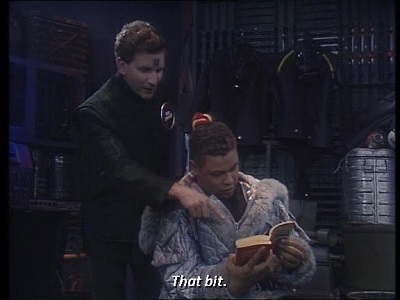No one would have believed, in the last years of the 20th century, that novelisations of low-budget BBC science fiction comedy series would turn out to be just about the peak of literature. In another similarity to the Hitchhiker's Guide, the Red Dwarf novels are a trilogy that can't count.
I first read 'Dwarf at the age of eleven, having seen bits of the TV series since the age of eight, so all bets are off for a fair and balanced overview. (It's a shame I didn't get around to Douglas Adams a few years earlier than I did so they could get the full benefit of juvenile obsession, but they still did well as a more considered favourite).
The first book, Red Dwarf (call it by its name), retells and expands the story free from the budgetary and technological constraints of an '80s sitcom. I hadn't seen the early years at the time, so my imagination was similarly unfettered. It was still clear enough which parts were culled from scripts with 'said Rimmer' inserted, but it held together superbly as one glorious whole.
Since I've caught up with the episodes, the more interesting parts have been the expansions and worlds-building digressions, but it's also impressive as a piece of literature if you've never seen the show. The characters are rich and develop (with one obvious exception), we get inside their heads (figuratively and less so) and there's setup and payoffs galore. There's even a bit where they use the mining ship to do some actual mining, as if that had been a tease all along! Basically, it's fantastic.
The sequel, Better Than Life, was unlikely to be as perfect, and that's fine. What it lacks in character it makes up in spectacle, featuring the most inspired sci-fi set pieces of the trilogy. These were dazzling enough to convince me it was probably the better book for a while, but it doesn't hold together as well as the first. That doesn't take away from the omnibus edition of the first two novels being one of the best books in existence, even versions with crazy covers.
The TV series had moved into fast-paced action and monsters of the week by this point, and the adaptation follows suit, to the extent that Lister gets knocked around like a planetary pool ball from one calamity to another. They reflect on this unfairness at the end and make amends to the character with something approaching a happy ending. It's a valid departure point and one that for many years I chose.
Grant/Naylor ended their writing partnership in 1995, to the detriment of the TV series and confusion of the novels. They'd apparently made very little progress on their third novel (tentatively titled The Last Human) before calling it a day, and Doug Naylor published his solo version of Last Human in November that year, picking up after the events of Better Than Life.
To fulfil their four-book contract, and maybe because he wanted a go too, Rob Grant published his own solo novel Backwards in March 1996, also picking up after the events of Better Than Life. Both avenues turned out to be cul-de-sacs as the novel series ended theres.
This schism always put me off the solo novels. Accepting dual continuities was no challenge for what was already a separate continuity from a TV series that has its own infamously incoherent continuity. Both novels take place across multiple universes and feature multiple versions of the characters to the point that having two third books even adds a clever meta layer, if you're generous. No, I was just disappointed that neither was good enough to be the worthy successor.
Fortunately, it turned out I was wrong.
Last Human was the only one of the pair I had back in the day, since my school library didn't have the abridged audiobook tester for that one. It had some good ideas, and it tapped the vibe of the Starbug-based series that were my specific childhood nostalgia, but it took me a lot of school silent reading sessions to get through, and some of those were just sharing the dodgy sex scenes with colleagues.
I'd only "read" Backwards in the abridged audiobook version and found it a bit too grim. Unlike the earlier audiobooks, it didn't even have Chris Barrie doing all the voices to make it more worthwhile.
Some 20 years later, I finally got around to reading Backwards properly, as the third novel in sequence, and found it much more impressive, entertaining and consistent with the earlier books, if still excessively grim as an ending.
I've just read it again, and the bits that bothered me last time didn't matter so much any more. It even has a sort of happy ending, if you're generous. A difficult third novel, not only numerically speaking, but still the true and worthy sequel, and probably less of a step down from the second than that was from the first.
Rob Grant's interest in Red Dwarf has seemingly been rekindled in the last couple of years, so I'm looking forward to the possibility of a fifth novel for the four-book trilogy, one that will conventionally forget about crucial plot developments and hopefully won't take me 20 years to appreciate this time. Until then, there's always Pink Dwarf, I guess.









